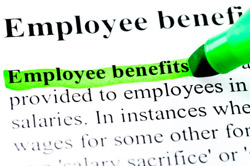 A good number of people have no idea what breaks they are entitled to take after working a certain amount of hours. Many people currently work long hours during the day without breaks – either because they choose not to take one or simply because that right is unknown to them. As a matter of fact, people are actually surprised when told about the meal and rest breaks employers are required to give to employees depending on the number of hours that are worked each day.
A good number of people have no idea what breaks they are entitled to take after working a certain amount of hours. Many people currently work long hours during the day without breaks – either because they choose not to take one or simply because that right is unknown to them. As a matter of fact, people are actually surprised when told about the meal and rest breaks employers are required to give to employees depending on the number of hours that are worked each day.
Meal Periods
California requires that every employee who works more than five (5) hours each day must be given at least a thirty (30) minute meal period. This is probably most applicable to the general public since the standard full-time job is about 40 hours per week, 8 hours per day. Although some employers do offer up to an hour lunch, they are actually only required to give half an hour and MUST give at least half an hour. Alternatively, if a total workday is six (6) hours or less, the meal period may be waived by mutual consent of both the employer and employee.
If an employee works more than 10 hours per day, a second thirty (30) minute meal period is required. This second meal period may be waived by mutual consent of both the employer and employee if the total hours worked does not exceed twelve (12) hours and only if the first meal period was not waived.
Unless the employee is relieved of all duty during his/her thirty (30) minute meal period, the meal period is considered an “on-duty” meal period that is counted as hours worked which must be compensated at the employee’s rate of pay. However, such “on-duty” meal periods are permitted only when the nature of the work prevents an employee from being relieved of all duty and when by written agreement between the employer and employee an on-the-job meal period is agreed to. The written agreement must state that the employee may, in writing, revoke the agreement at any time. Some examples of when the nature of the work prevents an employee from being relieved of all duty (based on an objective standard) include a sole worker in a coffee kiosk, a sole pharmacist at a pharmacy, a sole worker in an all-night convenience store, a security guard stationed at a remote site, etc.. Even where the employee is relieved of all work duties but is still required to remain at the work site or facility during the meal period, the meal period must be paid.
If an employer fails to provide an employee w/ a meal period in accordance with what is required, the employer must pay one additional hour of pay at the employee’s regular rate of pay for each workday that the meal period is not provided.
Rest Breaks
Employers must allow non-exempt employees to take a rest period that must, insofar as practicable, be taken in the middle or each work period. The rest period is based on the total hours worked daily and must be at the minimum rate of ten consecutive minutes for each four (4) hour work period, or a major fraction thereof. Thus, an employee who typically works an eight-hour workday may be entitled to two ten-minute breaks. On the other hand, rest periods are not required for employees whose total daily work time is less than 3 ½ hours.
Because rest periods are counted as time worked, the employer must pay for these periods. Consequently, employees can be required to remain on the employer’s premises during such periods. Where the employer does not authorize or permit a rest period, the employer must pay the employee one hour of pay at the employee’s regular rate for each workday that the rest period was not provided.
Retaliation
Despite an employee’s knowledge of the meal and rest breaks he or she is entitled to, rounding up the courage to demand those breaks is another story. Many people would rather just work through the hours without requesting breaks due to fear of losing their jobs. That is why California law also protects an employee against retaliation by the employer. Where an employer discriminates or retaliates (i.e., by demoting or terminating) against an employee because he or she objects to the fact that the employer is not providing employees with rest breaks or threatens to file a claim with the Labor Commissioner, the employee can file a discrimination/retaliation complaint, or in the alternative, obtain an attorney’s assistance in filing a lawsuit against the employer.



